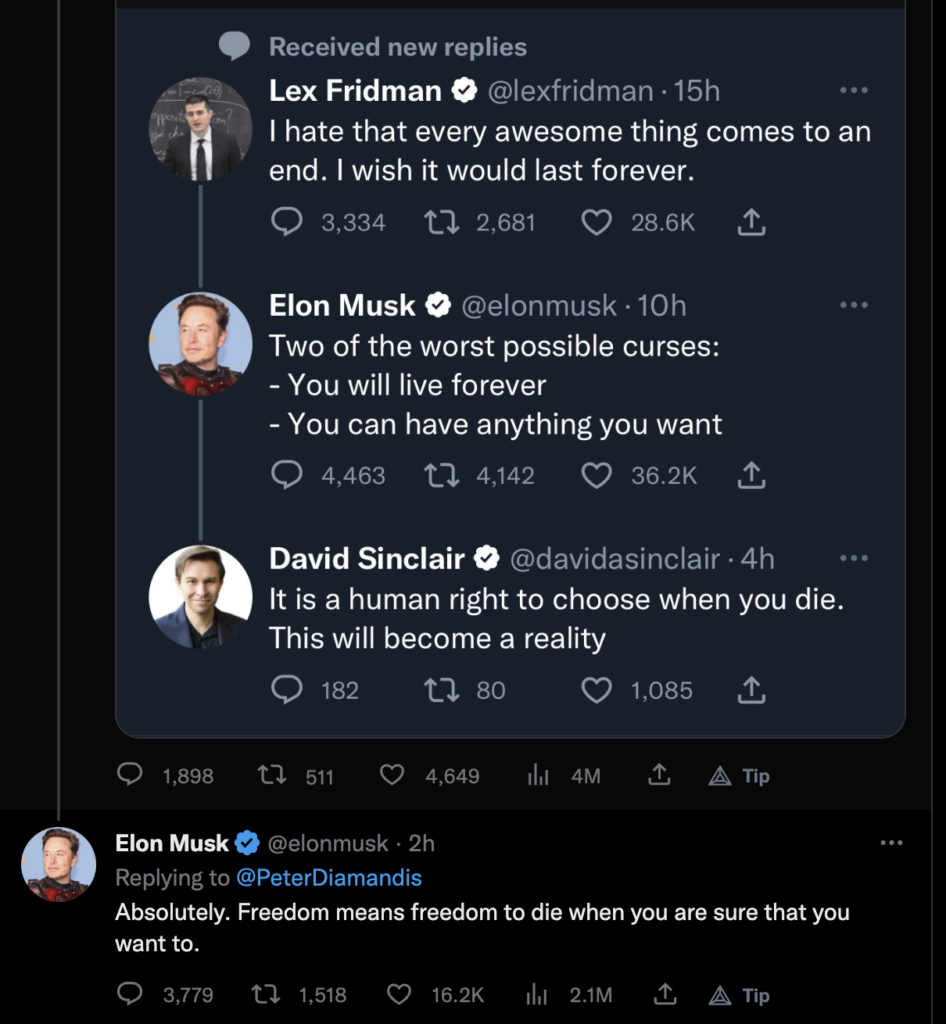23
Jan
2023
A Conversation among the Checkmarks
/
This will not be a long post. I am simply commenting on how the blue check marks (“important” Twitter users) think.[1] Notice the screenshot below.

A few comments:
- Fridman’s initial comment is an exposition of the truth of Ecclesiastes 3:11; namely, God has set eternity in man’s heart.[2]
- Musk’s answer to the initial question is true IF eternal life was in this sinful world or if having everything one wants means having everything one’s twisted, sinful desires wants. Graciously, God prevented Adam from eating of the Tree of Life, preventing this.
- As Pastor Ben Edwards noted in our church on Sunday morning (citing this same interchange), what Musk describes is hell. Living forever in our fallen nature and having the fullness of what we seek after leads necessarily to eternal destruction.
- As Pastor Ben also mentioned, there is an option Musk is not considering here. What if sin were reversed and our desires were pure? This is the very definition of heaven.
- Sinclair’s response to Musk shows the autonomous impulse of humanity. We live in an age where we can control everything. Designer babies are quickly on the way, and a growing number of people legitimately believe they can change their very gender. Victory over death is a goal of fallen humanity. Notice also that he places the right to die in the “human right” category. This is ironic when the right of many to live (infants in the womb) is denied.
- Musk’s response once more shows the fallen human commitment to autonomy. Such a commitment makes sense. Having no control over the timing of death indicates the utter powerlessness of humanity. Of course, Scripture ascribes to God the extent of our lives (Psalm 139:16; Job 14:5; Acts 17:25, 26). But since becoming “free” (at the initial fall), mankind has sought to idolize freedom. The ironic truth is that freedom exists only where autonomy is released (John 8:36; 2 Cor 3:17; Gal 5:1, 13). Submission to God grants the freedom men really need, for it satisfies the eternal longing of the heart (Fridman) and provides for an eternal life worth living (Musk).
[1] Recently the check marks changed and have become a subscription model for Twitter. These men, however, had the check mark when it was a badge of notoriety.
[2][1] In this interpretation, I agree with Garrett, Duane A. Proverbs, Ecclesiastes, Song of Songs. NAC. Nashville: Broadman & Holman Publishers, 1993.,




Thanks for this, Tim.
Musk’s final response also shows where sinful autonomy ironically ends: death. We crave freedom, and what do we do with it? We literally wish to kill ourselves.
Excellent additional observation, Ryan.
It is surely hard for you to explain the results of Adam eating the fruit, if the fruit did not have a physical, biological effect upon Adam. Death passed upon all men even over those who had not sinned after the similitude of Adam’s transgression. All Adam’s descendants came to have sinful flesh. Your objection that the tree was part of God’s good creation, could be answered by the observation that even good things can bring bad results when used contrary to directed use.
See an explanation of how the fruit may have affected Adam in theology slides: The Blood of the Grape accessed through https://theologypoints.org/posts/